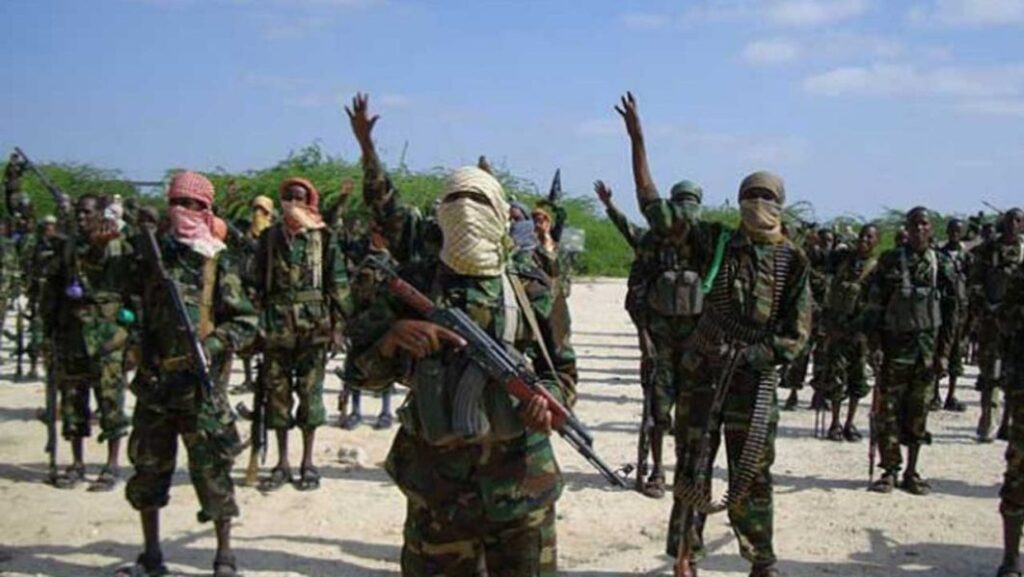UK and US activists urge ICC Prosecutor to expedite trial of murderers
By Jeph Ajobaju, Chief Copy Editor
Four non-governmental organisations (NGOs), three based in the United Kingdom and one in the United States, have petitioned International Criminal Court (ICC) Prosecutor Karim Khan over his approach to terrorism in Nigeria.
They urged him to “expedite action on Nigeria” since he has documented that “the criteria for opening an investigation into a string of abductions and closure of schools in some parts of Nigeria have been met.”
The petitioners took issue with Karim’s remarks when he met with President Muhammadu Buhari in Abuja on 20 April which they said contradicts his earlier position on the prosecution of terrorists in Nigeria.
“Whether intended or not, your recent remarks have given the impression that the ICC is willing to abdicate its core duties by outsourcing to … Buhari the responsibility for initiating an investigation into himself – a position that the State clearly resists,” the NGOs said in the letter dated 25 April.
The petition was jointly written by:
- Emmanuel Ogebe – Special Counsel, Justice for Jos Project (USA)
- Baroness Caroline Cox – Independent Member of UK House of Lords and Founder President of Humanitarian Aid Relief Trust (HART)
- Mervyn Thomas – CMG, Founder President of Christian Solidarity Worldwide (based in the UK)
- Ayo Adedoyin – CEO of International Organisation for Peacebuilding and Social Justice (PSJ-UK)
________________________________________________________________
Related articles:
USNLG petitions US over Bala’s jailing, Khalid’s sack
US lawmakers want Nigeria relisted as religious persecutor
US agency insists Nigeria still violates religious freedom
CSW wants Nigeria back on religious freedom violators’ list
Ogebe kicks as U.S. removes Nigeria from list of ‘Religious Freedom’ violators
________________________________________________________________
Petition by the NGOs
The letter is reproduced below:
Dear Prosecutor Khan,
We write to express our grave concerns over your remarks during a recent meeting with President Buhari in Nigeria.
Lack of urgency
According to reports, you described extremism in Nigeria as a cancer “which spreads and can also recede’’ and said the ICC prefers “collaboration over confrontation.”
While we agree with your broad sentiment that extremism is a vicious cancer, we are much less optimistic that it can also recede. On the contrary, Islamist violence continues to escalate in northern and central Nigeria.
We receive daily reports of mayhem, rape, abductions, enslavement and land-grabs.
Tens of thousands have been killed or wounded in horrific terrorist attacks. Millions are displaced by insecurity and fear. Children cannot go to school, at the expense of their education.
Boko Haram, ISWAP and other terrorist groups show no sign of retreating.
Without a meaningful response from the Nigerian Government and international partners, including the ICC, there is no indication that such a ‘cancer’ will recede.
In this context, we are especially concerned by your emphasis on “collaboration over confrontation.” Such an approach has failed for over a decade.
Indeed, successive reports of your predecessor voiced frustration with the Nigerian Government’s lack of collaboration, while numerous credible reports suggest that elements of the Nigerian Government may be complicit in violence and only occasionally investigate or prosecute those responsible for such crimes.
Your office has received many such complaints.
The Nigerian Government has been unable to stop the violence. It has failed to ensure justice or recompense for victims. We would therefore be grateful if you could clarify your remarks, which indicate a degree of complacency towards the escalation of Islamist violence.
Protracted process
Reports of your meeting with … Buhari suggest that you urged his government, in concert with other Sahel/Lake Chad basin countries, to “get the UN Security Council to refer the atrocities committed by the terrorist groups operating in the region to the ICC for investigation and trial.”
This contradicts your previous letter on Nigeria, which confirmed to the Socio-Economic Rights and Accountability Project [SERAP] that the criteria for opening an investigation into a string of abductions and closure of schools in some parts of Nigeria have been met:
“…The preliminary examination of the petition is considered complete. Under Article 53 of the Rome Statute, the next step in the judicial process is for the Prosecutor’s Office to prepare and submit a request to the Pre-Trial Chamber for authorisation to open an investigation on Nigeria.” (Ref. OTP-CR-363/21, 22 October 2021)
Your first publicised letter after assumption of office in 2021 on the status of ICC’s Nigeria inquiry stated that the next step is for your office to prepare and submit a request to the Pre-Trial chamber for authorisation to open an investigation into Nigeria.
At no point did you say that the process was to approach Nigeria (a suspect for Rome Statute crimes) to approach the UN for a referral to the ICC.
Whether intended or not, your recent remarks have given the impression that the ICC is willing to abdicate its core duties by outsourcing to Buhari the responsibility for initiating an investigation into himself – a position that the State clearly resists.
As the Chief Prosecutor of the ICC, you already have the mandate to open an investigation process in The Hague.
Your reported suggestion that Nigeria should “get the UN Security Council to refer the atrocities to the ICC for investigation and trial” is confusing, convoluted and will cause further delay, at a time when killings and atrocities continue to escalate.
Lack of political will
In your first annual report as Prosecutor to the Assembly of State Parties, you said:
“In relation to Nigeria, on 11 December 2020, the OTP announced the completion of its preliminary examination, having concluded that there was a reasonable basis to believe that war crimes and crimes against humanity were committed and that the statutory criteria for opening an investigation were met.
“Given the limitations of the Office’s operational capacity, prior to adopting a decision on seeking judicial authorisation to proceed, the Prosecutor continued to conduct a prioritisation review across all situations and cases in order to manage the Office’s workload within existing resources and to explore all avenues for complementary action at the national and/or regional level.” (December 2021)
It is our understanding that Rome Statute provisions do not give you the latitude to “adopt a decision on seeking judicial authorisation to proceed.”
Article 15(3) states: “If the Prosecutor concludes that there is a reasonable basis to proceed with an investigation, he or she shall submit to the Pre-Trial Chamber a request for authorisation of an investigation.”
The Prosecutor does not have the discretion not to submit a request to the Pre-Trial chamber as the duty is mandatory (“shall”) and not optional (“may”).
There is no legal basis for the untoward delay in proceeding to the Pre-Trial chamber for 16 months. The wait for “adoption of a decision on seeking judicial authorisation” is a principle unknown to the law.
Meanwhile in February 2022, you acted swiftly to open an investigation into the situation in Ukraine, which is not an ICC member state. Your response in Ukraine provides an important blueprint for action on Nigeria because:
- You recognised that “the importance and urgency of our mission is too serious to be held hostage to lack of means.”
- You acted on your own without a referral from any state party (while countless Article 15 submissions on Nigeria have been made to your office over the previous decade.)
- You reaffirmed previous conclusions that there was a reasonable basis to proceed.
- You acknowledged the importance of filing at the Pre-Trial chamber.
- Although you mentioned the option of a referral process, you did not suggest the protracted UN referral process as per your recent conversation with … Buhari.
We urge you to expedite action on Nigeria.


